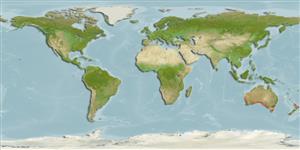Teleostei (teleosts) >
Eupercaria/misc (Various families in series Eupercaria) >
Labridae (Wrasses)
Etymology: Austrolabrus: Composed from Austro = the south + Greek, labros = furious (Ref. 45335); maculatus: From the Latin 'macula' meaning spot, referring to the dark spots on the body..
More on author: Macleay.
Environment: milieu / climate zone / depth range / distribution range
Ecology
Marine; reef-associated; depth range 10 - 40 m (Ref. 26203). Temperate
Eastern Indian Ocean: southern Australia, from Western Australia to New South Wales.
Size / Weight / Age
Maturity: Lm ? range ? - ? cm
Max length : 12.6 cm SL male/unsexed; (Ref. 26203)
Adults occur inshore (Ref. 75154). Oviparous, distinct pairing during breeding (Ref. 205).
Life cycle and mating behavior
Maturities | Reproduction | Spawnings | Egg(s) | Fecundities | Larvae
Oviparous, distinct pairing during breeding (Ref. 205).
Russell, B.C., 1988. Revision of the labrid fish genus Pseudolabrus and allied genera. Rec. Aust. Mus. (Suppl. 9):1-72. (Ref. 26203)
IUCN Red List Status (Ref. 130435)
Threat to humans
Harmless
Human uses
Tools
Special reports
Download XML
Internet sources
Estimates based on models
Preferred temperature (Ref.
123201): 15.3 - 22.6, mean 17.7 °C (based on 80 cells).
Phylogenetic diversity index (Ref.
82804): PD
50 = 1.0000 [Uniqueness, from 0.5 = low to 2.0 = high].
Bayesian length-weight: a=0.01995 (0.00922 - 0.04317), b=2.99 (2.79 - 3.19), in cm total length, based on LWR estimates for this (Sub)family-body shape (Ref.
93245).
Trophic level (Ref.
69278): 3.4 ±0.4 se; based on size and trophs of closest relatives
Resilience (Ref.
120179): High, minimum population doubling time less than 15 months (Preliminary K or Fecundity.).
Fishing Vulnerability (Ref.
59153): Low vulnerability (10 of 100).
Nutrients (Ref.
124155): Calcium = 31.3 [12.7, 58.7] mg/100g; Iron = 0.248 [0.116, 0.561] mg/100g; Protein = 18.3 [15.5, 20.6] %; Omega3 = 0.334 [0.161, 0.694] g/100g; Selenium = 5.44 [2.27, 13.30] μg/100g; VitaminA = 72.9 [14.6, 494.1] μg/100g; Zinc = 0.739 [0.440, 1.450] mg/100g (wet weight);
